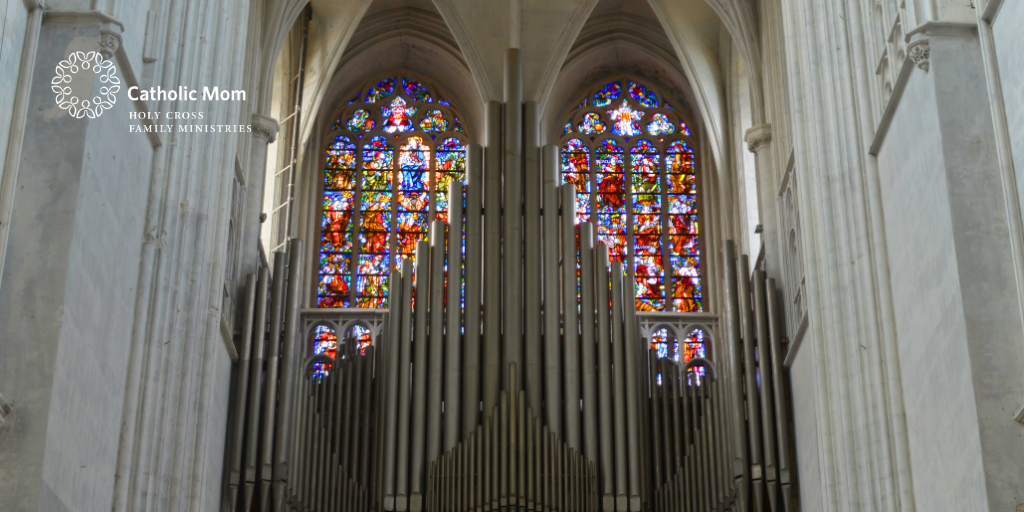
Laura Steiner reflects on lessons learned through her funeral music ministry.
As a military spouse and mother of little ones, I have learned to live with a keen awareness of life’s fragility. My husband’s “quiet” deployment to Iraq erupted in nearly daily attacks on American forces following the outbreak of the Israel-Hamas war in the fall of 2023. Every conscious minute of the day for six months, while pregnant and parenting a young toddler, I prayed for his deliverance from danger. Several soldiers made the ultimate sacrifice and did not come home. Even stateside, military life carries its own risks, as tragic training accidents and sudden losses occur all too often.
I cantor for military funerals once or twice a month — far more than most people attend in a year. Singing from the cantor stand during these liturgies regularly places me at the intersection of grief, hope, and the proclamation of the Resurrection. I have come to realize that funeral liturgies evangelize us. They guide us on how to live well, how to love God and one another, and how to prepare for our own death.

Lesson One: Funerals Highlight the Centrality of Jesus’ Resurrection
The Catholic funeral liturgy is profoundly paschal in nature. Every antiphon, prayer, and hymn proclaims Jesus’ victory over death and the hope of eternal life. It is not a sentimental remembrance focusing solely on the departed; rather, we are constantly encouraged to grow in the theological virtue of hope by contemplating the Resurrection.
For military families, where sacrifice and danger are an unavoidable part of our way of life, the proclamation of Jesus’ resurrection is both an anchor and an inspiration: Death does not have the last word. Funeral liturgies encourage us to live as people who truly anticipate eternal life, and make decisions about the way we work, pray, and live with eternity in mind, rather than seeking comfort or convenience.
Lesson Two: Funeral Hymns Offer Holy Comfort
Singing the In Paradisum and hymns like “Jesus, Remember Me” or “How Great Thou Art” is deeply consoling. The hymn texts are not mere platitudes to make us feel better; they are prayers the Church places on our lips as we accompany a soul toward God.
Often, while chanting the In Paradisum, I will gaze on the casket or urn and lovingly pray for the departed. Even though they are usually strangers to me, it almost feels like I’m singing a mother’s lullaby, giving comfort at the end of this earthly pilgrimage.
Consider incorporating musical habits of hope in your family. Sing with your children, play hymns at home, and encourage their talents. One day they may grow up to use their gifts in service of others.
Lesson Three: Cantoring is a Work of Mercy
Attending and ministering at funerals knits together several of the spiritual and corporal works of mercy. We “bury the dead,” we “pray for the living and the dead,” we “comfort the sorrowful,” and even “instruct the ignorant.” Offering my voice is a form of accompaniment. Many times, the congregation may be largely non-Catholic, or too mournful to participate actively in the Mass responses. I can show up for these families in their most sorrowful moments by providing comfort, beauty, and peace through music.
This lesson encourages us to practice these corporal and spiritual works of mercy in our family, parish, and circle of friends. Show up for those who are mourning, and pray for the dead.
Lesson Four: Funerals Teach Us How to Live Well
Funeral liturgies form the soul and affirm us in these convictions: we know that one day we will die, and life is an utter and complete gift of love from the Father. Christ has risen from the dead, and therefore we hope to one day rise and live with Him forever. Love and faith sustains us - not our earthly belongings or social status. Holiness is found in the ordinary sacrifices of lay life.
Funerals teach us to find consolation in encountering Christ in the sacraments. We are encouraged to prepare spiritually through regular acts of charity and daily prayer. We can prepare relationally by practicing forgiveness and mercy, and being present with our loved ones. We can prepare practically by calmly drafting our wills and our own funeral plans.
This lesson demands humility: Receive the sacraments frequently — particularly Reconciliation and the Eucharist. Reconcile quickly with loved ones. Pray for a holy death, trust in God’s protection, and have hope in the Resurrection. Practice detachment from things that do not save.

Funerals reveal to us the profound mysteries of life and death and offer important lessons in Christian discipleship. Our hope in the Resurrection is not abstract, but embodied. May these lessons guide us to live with joy in the Risen Christ, and to be prepared, too, for the day when the angels lead us into paradise.
Share your thoughts with the Catholic Mom community! You'll find the comment box below the author's bio and list of recommended articles.
Copyright 2025 Laura Taylor Steiner
Images: Canva
About the Author

Laura Taylor Steiner
Laura Taylor Steiner is an active duty Army spouse and mother of two, and currently resides in northern Virginia. She holds a B.A. in Theology and Music, as well as a master’s and Ph.D. in Theology from the University of Notre Dame. She recently became a stay-at-home mom, and is in formation with the Lay Dominicans of the St. Joseph Province.


.png?width=1806&height=731&name=CatholicMom_hcfm_logo1_pos_871c_2728c%20(002).png)
Comments